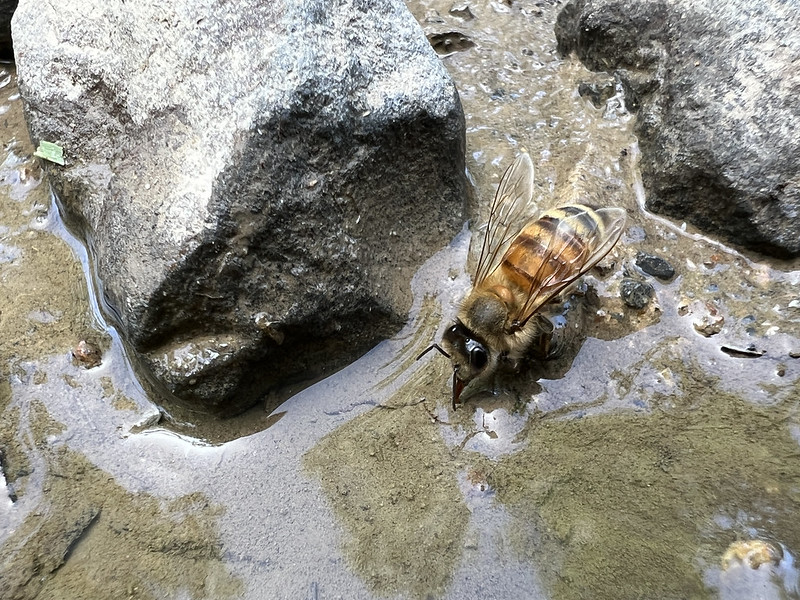June 15, 2022
Bees need watering too
By Mary Hightower
U of A System Division of Agriculture
Fast facts
- Bees use water to aid evaporative cooling in hive
- Bees need a platform such as gravel to access water
(456 words)
(Newsrooms: With additional art at https://flic.kr/s/aHBqjzUiJN)
LITTLE ROCK — When temperatures rise, so does the need for honey bee hydration, said Jon Zawislak, an extension expert in bees and urban entomology for the University of Arkansas System Division of Agriculture.
“Bees may be able to get sufficient water from the nectar they drink to get by, but they are often found drinking water from other sources in the summer,” he said. “Honey bees particularly need extra water because they use it to cool their hives in the summertime.”
Despite their small size, the thousands of honey bees in a colony can generate a lot of heat.
“Honey bees maintain a fairly constant temperature of 93 degrees inside their nest, which is the perfect temperature to incubate baby bees,” Zawislak said.
The bees moderate hive temperature in a couple of ways. The first is by fanning outside air into the hive.
“Many bees will line up together, facing one direction, and actively fan their wings, creating air currents into and out of a bee hive,” he said. “They bring in fresh, cool, oxygen-rich air while blowing out the stale, humid air filled with carbon dioxide.”
The tactics change when the temperatures rise and just bringing in outside air doesn’t help as much.
“The bees then rely on evaporative cooling,” Zawislak said. Bees have a nectar crop — an extra stomach-like organ used to haul nectar back to the hive. During hot weather, bees fill the crops with water.
“Back at the hive, the busy bees will deposit tiny droplets of water all around the hive,” he said. “As the bees fan their wings, the moving air evaporates the water and carries some of the heat away with it. They use the same activity to evaporate water from nectar to help turn it into honey.”
Help hydrate your bees
It’s easy to provide a water source for pollinators.
“You can leave a dish out for them or keep your bird bath full if you don't mind them buzzing around your garden,” Zawislak said. “Bees can't swim, though, and they can't sip while on the wing like a hummingbird.”
Bees must land to take a drink, so they need a “platform” to reach the water.
“You can fill a container with clean gravel they can sit on while they sip or provide them with pieces of wood floating in the water for them to land on,” he said. “Bees will also visit swimming pools and hot tubs if they can't find any other water sources. They will usually be found sipping from puddles splashed around the pool and won't try to get to climb down the ladder. So be mindful of them as you walk around in your bare feet.”
Learn more about bees at the UABeeBlog.
To learn more about Division of Agriculture research, visit the Arkansas Agricultural Experiment Station website: https://aaes.uark.edu. Follow on Twitter at @ArkAgResearch. To learn more about the Division of Agriculture, visit https://uada.edu/. Follow us on Twitter at @AgInArk. To learn about extension programs in Arkansas, contact your local Cooperative Extension Service agent or visit www.uaex.uada.edu.
About the Division of Agriculture
The University of Arkansas System Division of Agriculture’s mission is to strengthen agriculture, communities, and families by connecting trusted research to the adoption of best practices. Through the Agricultural Experiment Station and the Cooperative Extension Service, the Division of Agriculture conducts research and extension work within the nation’s historic land grant education system.
The Division of Agriculture is one of 20 entities within the University of Arkansas System. It has offices in all 75 counties in Arkansas and faculty on five system campuses.
Pursuant to 7 CFR § 15.3, the University of Arkansas System Division of Agriculture offers all its Extension and Research programs and services (including employment) without regard to race, color, sex, national origin, religion, age, disability, marital or veteran status, genetic information, sexual preference, pregnancy or any other legally protected status, and is an equal opportunity institution.
# # #
Media contact:
Mary Hightower
mhightower@uada.edu
501-671-2006
